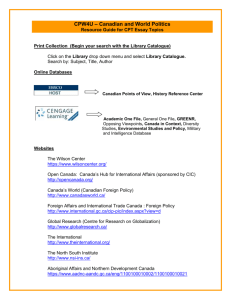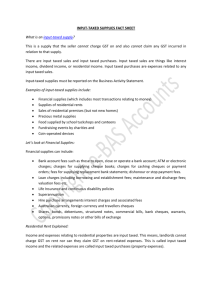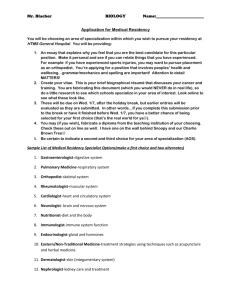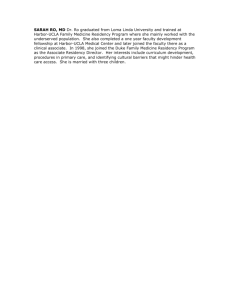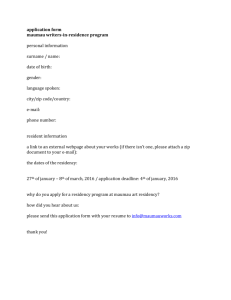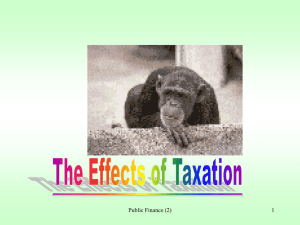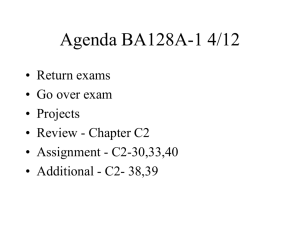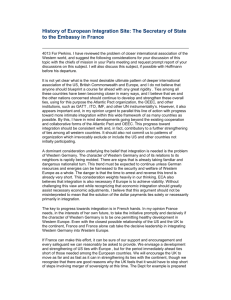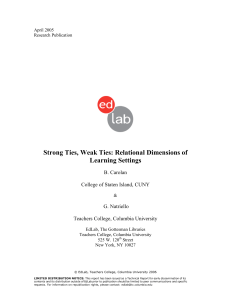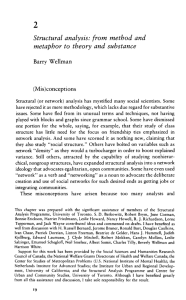U_of_T_NICE_175131_Financial_Literacy_BigWebTool_O
advertisement
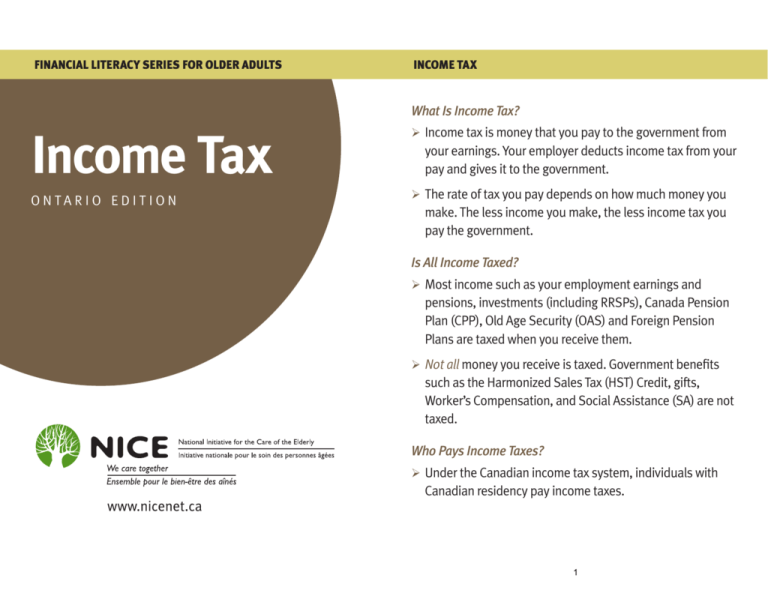
FINANCIAL LITERACY SERIES FOR OLDER ADULTS INCOME TAX What Is Income Tax? Income Tax O N TA RIO EDITIO N ¾¾ Income tax is money that you pay to the government from your earnings. Your employer deducts income tax from your pay and gives it to the government. ¾¾ The rate of tax you pay depends on how much money you make. The less income you make, the less income tax you pay the government. Is All Income Taxed? ¾¾ Most income such as your employment earnings and pensions, investments (including RRSPs), Canada Pension Plan (CPP), Old Age Security (OAS) and Foreign Pension Plans are taxed when you receive them. ¾¾ Not all money you receive is taxed. Government benefits such as the Harmonized Sales Tax (HST) Credit, gifts, Worker’s Compensation, and Social Assistance (SA) are not taxed. Who Pays Income Taxes? ¾¾ Under the Canadian income tax system, individuals with Canadian residency pay income taxes. 1 INCOME TAX INCOME TAX Who Pays Income Taxes? (continued) ¾¾ Newcomers to Canada gain residency for income tax purposes once they establish residential ties with Canada. ¾¾ Some examples of residential ties include: a. Having a home in Canada; b. Having a spouse or common-law partner or dependants move to Canada to live with you; c. Owning personal property in Canada, such as a car or furniture; and d. Having social ties in Canada, such as membership in a Canadian recreational or religious group. ¾¾ Newcomers to Canada who have established residential ties with Canada may be: a. Protected persons (refugees); b. People who have received permanent resident status from Citizenship and Immigration Canada (CIC); c. People who have applied to CIC to be permanent residents; or d. People who have approval-in-principle from CIC to stay in Canada. Note: 2 NOTE: Many factors can be used to determine a person’s residency status in Canada. For more information, contact the Canada Revenue Agency (CRA) at 1-800-267-5177 (toll-free in Canada and the United States). From other regions, please call 613-952-3741 (English) or 613-954-1368 (French). You can also refer to the Income Tax Interpretation Bulletin, IT-221R3, Determination of an Individual’s Residence Status, available at: http://www.cra-arc. gc.ca/E/pub/tp/it221r3-consolid/it221r3-consolid-e. html Why You Should File An Income Tax Return yy If you owe tax, you must file a return. yy If you do not owe tax or you have no income, you should still file a return because you may receive government benefits or money back. yy If you paid too much tax, you will get a refund. yy You may get a GST/HST Credit for low and modest income individuals. yy You may get tax credits and family benefits from the province or territory where you live (see the Accessing and Optimizing Pensions and Public Benefits pocket tool). 3 WHERE CAN I GET MORE INFORMATION? For help preparing your income tax return: Free Chartered Accountant (CA) Income Tax Clinics occur in Ontario at various community agencies from mid-February until the end of March. ¾¾ To qualify, your total household income must be below $30,000 with dependents or below $20,000 without dependents. Individuals with rental income and/or business income do not qualify for the Free CA Tax Clinics, regardless of the amount of income. FINANCIAL LITERACY SERIES FOR OLDER ADULTS © This is one of the series of Financial Literacy for Older Adults pocket tools. For more information about NICE tools or related training events, please visit www.nicenet.ca Disclaimer You should not rely on this pocket tool for financial or legal advice. It provides general information only. NICE is not responsible for any use of the information other than for general educational/informational purposes and no claim can be made against NICE or any of its personnel for any such use. 2005-2010 ¾¾ Contact: Institute of Chartered Accountants of Ontario, Phone: 416-969-4236 4
